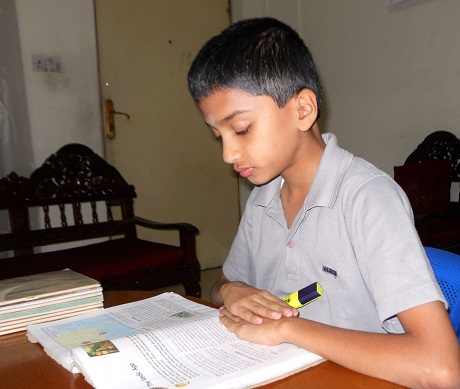How children learn - 4th, 5th and 6th graders
How children learn
The proverbial fourth grade slump has hit many a child and my son was not exempt from it. I was recently asked for some direction in this regard by a concerned parent. Poor learning skills is what I thought was the issue, but my research proved otherwise. This is what I learned and decided to share it with those facing similar problems. My son is a bright lad, but when he entered the fourth grade we noticed that he was not doing as well as before, his grades were falling, he went from a A+ to A and he was getting himself into trouble. The problem was not so evident, but being very academically oriented I constantly monitored his progress. Meeting with his teachers did not help as he is a favourite and they had nothing to tell me that I did not know. Since the slide in the fourth grade was nothing to worry about, I just let myself be at peace, still guiding him around with his work. He did fall to a B once this year in the fifth grade, but what troubled me most was that fact that his teachers were now complaining. His behaviour at school was not exemplary as it had been all these years. My worries led me do a lot of research and work in this area and I hope the results of this research helps parents who face similar issues with their children.

How to help children in the 4th, 5th and 6th grades learn
The fourth grade slump as it is called in the educational circles has many theories to it. This could happen any time between the second and the fifth grade. My research and work with teachers and my child threw up a few vital issues that need to be understood.
Firstly, there is a change in the academic progress of the child. Children at this age are hooked on to TV shows and gadgets that take away much of their time and attention, impairing their concentration. The fact that ten year olds have blackberries don’t help much. Teachers often have to resort to confiscating cellphones from children whom they find texting in class. Attention deficit is a major problem among fourth, fifth and sixth graders. It is not that they cannot focus on what is done in class, but they are more attracted to other things that grab and keep their attention. I believe ten years, or even twenty years ago, we as children never heard so much about ADD or attention deficit disorder. Back then children had nothing much to distract them than their own peers and other class activities. Many kids today do not have attention deficit disorder, but they are plagued by distractions. Their attention span or ability to concentrate is still the same but is diverted to many activities at the same time. Children today listen to music, talk on phones, chat with peers on social networking sites as they do their home work.
The second important observation that I would like to make is that 4th or 5th graders find themselves switching gears from learning to read to reading texts with a heavy information or content. Now the focus is on reading to learn subjects. There seems to be a sudden change in the way a child has been learning, and the child is often unprepared for the sudden acceleration in the pace and content of learning that he/she is used to, at the lower grades. Adjustment to change always takes time as it happens at a slower pace and children need extra help to settle into a comfortable pace in their method of learning.
The problems fourth, fifth and sixth graders face
Some children are better at grasping concepts than others. Having to read, comprehend, infer and apply the concepts learned may be a huge shift in the way learning has occurred in their younger days. Classroom participation is vital to effective learning. Engaging the child in classroom activities grabs the child’s attention and keeps the child actively participating in learning. Children who are passive and not participating withdraw into their own imaginative world shutting off learning. It has been found that when children are not totally engaged in what they are doing they tend to amuse themselves by playing, doodling, distracting themselves and others, in the process getting into trouble with teachers and administrators. If such children are not given the right kind of attention, it could not only make them passive, withdrawn but also produce bored children with behavioural issues. This resultant decline of interest in the subjects and slow disengagement from the classroom activities could lead to a slump in academic progress and it could well continue into adulthood for many.
Teaching only for the purpose of scoring high grades is absolutely futile. In the Asian curriculum children are forced to learn an overwhelming amount of information that they neither understand nor make sense of, hence rote learning is the most preferred mechanism to tide over the problem. This is not learning in the real sense of the word.
Excessive testing has been often reported to be the cause of this slump. Many educational institutions have remedied this but here where I live it is still a problem. Tests stretch for two full weeks taxing the child mentally, emotionally and physically to a certain extent.
Poor cognitive skills could also be due to poor understanding or poor vocabulary. This has to do with the pace of learning I had mentioned earlier. From learning easy words and simple vocabulary the pace of learning rapidly moves towards concepts and terminology. The comprehension of a child is challenged to the utmost. Children need to be acquainted to such a change in a well paced manner. In the Asian curriculum this never happens as teachers are faced with the daunting task of rushing through a vast syllabus to ‘cover the portions’ as they say here. It then falls upon the parents to bridge the gap. I for one think that parents have to be constantly involved in their wards learning/schooling. There very fact that you are associated with what is happening and are ready to help gives your child a high level of confidence.
Another important reason that could keep children form developing interest in reading and developing their cognitive skills is the absence of encouragement to read books on a wider range of topics or just the plain unavailability of books for the children to develop an interest in. Often children stick to particular types of books and feel comfortable with them. Encouraging children to read newspapers, instruction manuals, etc could not only increase their vocabulary but also help them think laterally and absorb a lot more than what they are taught to.
Having outlined the reason for the slump in academics I hope to follow this up with another article that helps parents handle this problem effectively. I appreciate your interest in staying with me to the end.









